|
|
|
|
|
 |
|
|
|
|
| |
 |
Inspired
by a parentЁЏs passion to help his
son and other struggling readers Founded
in 1984 with private funding and grants
from the National Institute of Child
Health and Human Development (NICHD)
Developed in collaboration with leading
reading researchers and dedicated
school systems
|
|
|
Є§40%
of students across the nation cannot read
at a basic level: National Assessment of Education
Progress
Є§70 % of older readers require some form of
remediation: Carnegie Corporation of New York
and Alliance for Excellent Education
Є§Almost half the students living in urban
areas cannot read at a basic level: National
Assessment of Education Progress
Є§Student
abilities and needs are diverse
- 19% of children ages 5~17 donЁЏt speak English
at home
- Minority students make up 43 % of public
school enrollment
- Two million students are placed in special
education each year due to reading failure
Є§The
issues are complex
- NCLB creates accountability requirements
- Limited time in the school day
- Demands of high stakes testing,
- Need for differentiated and data driven
instruction
- Budgets are stretched thin
|
|
| |
| |
Lexia
Meets the Challenge |
|
| |
- Addresses the needs
of all student abilities through individualized,
intensive practice
- Demonstrated results accelerating student
skill acquisition
- Informs and differentiates instruction
- Aligns with national and state standards
- Supports and strengthens core reading
curriculum
|
|
|
| |
|
|
| |
|
|
| Percentages
in each group vary in some schools as many
as 20 % are in SPED and 60-70% would benefit
from explicit instruction. |
|
| |
|
|
| |
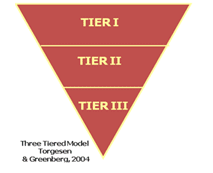 |
Є§TIER
ЅА : Enrichment
and Reinforcement - Supports
core reading programs with accelerated
independent phonics practice
Є§TIER ЅБ : Supplemental
- Strengthens reading sloills for
students who need practice in explicit
phonics strategies
Є§TIER ЅВ : Intensive
Support - Provides extended
practice to develop foundational phonics
strategies
|
|
|
| |
|
|
|
| |
|
|
- Validated
by Research: Rigorous outcomes studies show
significant reading gains
- Proven Methodology: Based on the structured,
sequential and cumulative Orton-Gillingham
approach
- A track record of success: 22 years, over
10,000 schools and 1 million students |
|
| |
| |
Informs
and Differentiates Instruction |
|
| |
- On
screen alerts notify teachers of student performance
- Detailed student and class reports identify
skills in requiring additional instruction
- Performance and demographic data enable
data driven decision making requirements |
|
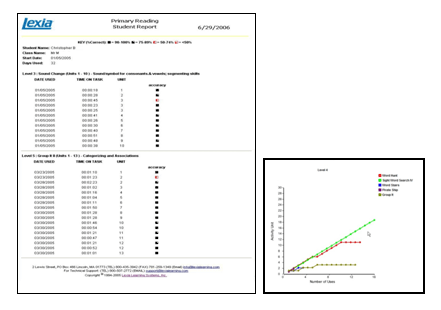 |
|
| |
| |
Aligns
with National and State Standards |
|
| |
Lexia
delivers intensive, explicit and structured
practice in skills that support:
- Phonological Awareness
- Phonics
- Fluency
- Vocabulary
- Comprehension> |
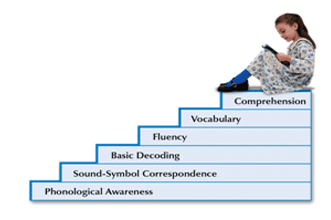 |
|
|
| |
|
| |
Teachers
believe in Lexia |
|
| |
 |
ЁАAfter
1 year of using LEXIA, I'm convinced
that Early Reading, Primary Reading
and Strategies for Older Students
helped us achieve AYP.ЁБ
Marice Diakite
Principal
|
|
|
|
| |
|
|
| |
 |
My
students are always eager to go to
Lexia. They are highly motivated and
engaged by the program. All children
are successful because of the independent
nature of the Lexia program.ЁБ
Donna M. Felzani, Teacher
|
|
|
| |
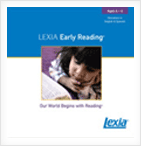 |
Lexia
Early Reading Ages 4-6
Introduces phonological principles
and the alphabet, helping students
master critical early literacy skills
|
|
| Level
1 : |
Develops
phonemic and phonological awareness.
Activities reinforce the precursors
to reading; rhyming, word segmentations,
and sound blending. The activities
in this level do not require alphabetic
knowledge.
|
| Level
2 : |
Introduces
alphabet skills. There are
five activities; three activities
introduce consonants, one activity
focuses on short vowels and one activity
introduces letter combinations. Students
are asked to listen for beginning
and ending sounds, including digraphs.
|
|
| |
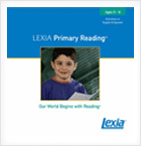 |
Primary
Reading Ages 5-8
Ensures mastery of basic phonological
skills and introduces more advanced
phonics principles
|
|
| Level
1 : |
Transition
to decoding. phonemic awareness,
sound-symbol correspondence, basic
decoding.
|
| Level 2 : |
Short
Vowel Words>; including CVC,
blends, and digraphs.
|
| Level 3 : |
Silent-e:
long-vowel (silent-e) words, sound
segmenting, contextual information.
|
| Level
4 : |
Vowel
Combinations, Vowel-r: Vowel
combinations, vowel-r words, word-attack
strategies and conceptual reasoning.
|
| Level 5 : |
Review:
Words in context (sentences and paragraphs)
|
| |
|
|
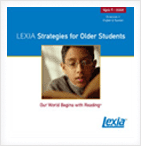 |
Strategies
for Older Students Ages 9-Adult
Sophisticated, age appropriate user
interface engages older students with
extensive practice in a wide range
of skills, from basic phonological
awareness to advanced word attack
and vocabulary
|
|
| Level
1 : |
Develops
automatic recognition of short vowel,
one-syllable words. Phonological
awareness of sound segments in initial,
medial and final positions, including
digraphs.
|
| Level
2 : |
Short
vowel words with blends and digraphs
and long vowel words. Develop
word-attack strategies, sound segmentation,
short and long vowel sounds, practice
in context.
|
| Level
3 : |
Decoding
two-syllable words. Advanced
word-attack strategies and reinforce
phonological awareness.
|
| Level
4 : |
Word-attack
strategies for multi-syllable words.
Open, closed and consonant-le syllables.
Single word, sentences and paragraphs
in contextual material.
|
| Level
5 : |
Structural
analysis as a means of word-attack.
Anglo-Saxon, Greek and Latin Word
roots as well as special accent
|
|
| |
|
| |
Lexia
Quick Reading Test Ђч |
|
| |
The LEXIA
Quick Reading TestЂч offers a quick placement
for student for student into the appropriate
Lexia program and level. Within five-to-eight
minutes, teachers gain an indispensable snapshot
of a studentЁЏs reading skills, strengths,
and gaps. This test determines a studentЁЏs
ability to use word-attack strategies and
evaluates automaticity with basic sight words.
A huge time saver, it automatically tracks
responses, interprets them, and generates
reports that summarize a studentЁЏs performance
and identifies where practice or instruction
is needed. Reports may reflect one studentЁЏs
progress or that of the whole class. |
|
 |
- Quick
decoding screen that evaluates word identification,
word-attack skills and automaticity
- Administered one-on-one in 5 to 8 minutes |
|
| |
| |
Lexia
Comprehensive Reading TestTM |
|
| |
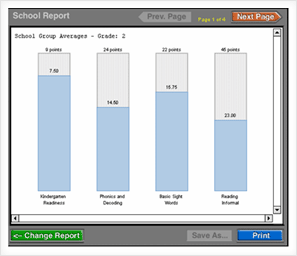 |
-
Computer-based reading assessment
evaluates full range of reading
abilities including:
-Kindergarten Readiness
-Phonics and Decoding Skills
-Sight Words
-Burns and Roe Reading Informal
-Extensive reporting features provide
vital information
|
|
|
|
| |
| |
|
 |
|

